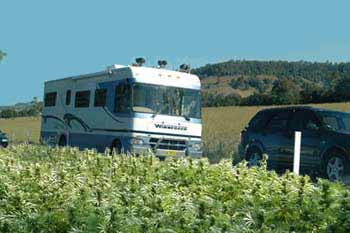 Legal
Information
Legal
Information
2008 Revised Version
Pot & The
Law
Under NSW law, cannabis is a “prohibited drug”.
It is an offence to possess, use, supply, or cultivate it. It
is also an offence to possess implements for the use of cannabis.
Possession
To prove a charge of drug possession, the prosecution
must prove that you had knowledge of the drug and custody or
control over it. In other words, they must prove that:
you had the drug in your physical custody (for example, in your
pocket), or at least under your control (such as in your bag,
or in a locker you have the key to)
and
you that knew that you had the drug in your custody or control.
Supply
”Supply” is defined in the legislation to include
a wide range of conduct: selling, giving away, agreeing to supply
or (technically) sharing pot is classed as supply.
”Supply” also includes being in possession of a
quantity of drug which is “deemed” to be intended
for supply. In a deemed supply case, you must prove in court
that the possession was for reasons other than supply (for example,
personal use). In the case of cannabis, the deemed supply amount
is 300 grams.
Cultivation
It is an offence to cultivate cannabis. Cultivation means some
activity to assist growing or harvesting. It includes planting
or watering or fertilising. Even growing one cannabis seedling
is an offence.
It is also an offence to possess cannabis plants (which has
the same maximum penalty as cultivation).
There are higher penalties - and trial by judge and jury - for
cultivating or possessing more than 250 plants. Cases involving
fewer than 250 plants are heard by a magistrate in the Local
Court.
Hydroponic plants
Recent changes to the law have created a separate offence of
cultivation of hydroponic plants. For cultivating as few as
5 cannabis plants “by enhanced indoor means”, the
maximum penalty is 15 years jail and a $385,000 fine (and 20
years jail for cultivating 200 or more hydroponic plants). But
the prosecution must prove the cultivation was “for a
commercial purpose” (which is not necessary for outdoor
cultivation cases).
Cookies
Possessing or supplying cannabis cookies or other food with
cannabis cooked in is illegal.
Bizarrely, the drug law strictly treats cookies as if they were
pure cannabis. So, because weight determines the nature of the
criminal charge, you could theoretically be charged with “deemed
supply” if you possess more than 300 grams of cookies,
even though you are mostly possessing chocolate and flour and
butter. In these situations, the police can and would charge
you only with possession.
If you are arrested
You do not have to answer police questions or make a statement,
even after you are arrested. Just give your name and address
so that bail can be granted.
Remember that the police must prove your guilt – anything
you say may make it easier for them to do just that. Generally
it is better to say nothing until you have had legal advice.
Police cautions
The police have the power to issue cautions (rather than take
you to court) for possession offences where the amount of marijuana
involved is 15 grams or less, and where you have no prior convictions,
and you are not being charged with another offence, and you
admit guilt. If you are cautioned twice, you must attend compulsory
drug counselling. On the third occasion, you must go to court.
Search warrants
Police are legally entitled to enter private property if they
have a search warrant, or if they are invited in by one of the
occupiers.
A search warrant gives police the power to search anybody found
on the premises, to use reasonable force to break open doors
and cupboards, and to seize and remove any illegal items discovered.
Personal searches
The police have the power to search you in a public place,
without a warrant, if the police believe on reasonable grounds
that you might possess a prohibited drug (or a knife, or evidence
of a crime).
Random Roadside Testing

Neither snow nor rain nor heat nor gloom of night stays
these drug testing winnebagoes from the swift completion
of their appointed rounds...
The police have the power to randomly drug test drivers, although
only for cannabis, amphetamine and ecstasy. The testing is by
saliva swab, with a screening test at the driver’s window.
If the initial test indicates positive to THC, amphetamine or
ecstasy, you have to give a second swab which is tested in a
specially equipped Winnebago drug bus. If that second swab shows
positive, the sample is sent to a laboratory for analysis. You
do not get arrested, although you are not permitted to drive
for 24 hours. You will be sent a court attendance notice after
laboratory results have confirmed the presence of the drug.
The maximum penalty for driving with the “presence”
of one of these drugs in your system is a $1,100 fine and 3
months minimum licence disqualification (the same penalty as
for low range drink driving). It is an offence to refuse to
provide a saliva sample or to fail to stop for a roadside drug
test when requested by police.
Sniffer dogs
Generally speaking, it is legal for police to use sniffer dogs
(although sometimes the need a warrant.).
There is legislation which authorises police use of dogs for
“drug detection” in some places (on trains and buses,
and on or near railway stations and bus terminals, in licensed
premises, at dance parties and music festivals) without a warrant.
The same legislation requires the police to obtain a warrant
to use sniffer dogs in other situations, for example to conduct
random street searches. The police might obtain a warrant to
use sniffer dogs on “high visibility” street patrols.
The courts have ruled that the action of a police dog sniffing
a person or an object does not amount to searching.
Penalties
The quantity of drugs involved determines both the maximum penalty
for the offence, and whether the case is heard in the Local
Court or the District Court.
The maximum penalty for use or possession is a fine of $2,200
and/or 2 years jail.
The maximum penalty for supply or cultivation depends on the
quantity involved. As an example, the maximum penalty for the
supply of 400 grams is a fine of $11,000 and/or 2 years jail.
The maximum penalty for cultivating or possessing 300 plants
is a fine of $385,000 and/or 15 years jail.
These are maximum penalties – the actual penalty imposed
will usually be considerably less, especially for a first offender.
For people with little or no criminal record, the penalty for
possession of small quantity of pot might be to have “no
conviction recorded” (a “section 10”) - or
alternatively, a fine of several hundred dollars. For cultivation
of a few plants: a fine or a good behaviour bond.
If larger quantities are involved, or you have more of a record,
or if you are convicted of supply or cultivation, you can expect
higher penalties.
TAKE CARE
"DECRIMINALISED"
STATE DRUG LAWS
Some States and the Territories have implemented automatic
set penalties for less serious cannabis offences. This is sometimes
misleadingly referred to as “decriminalisation”.
The details vary between jurisdictions, but the general idea
is that police can issue you with a form of infringement notice
to pay a set fine within the specified time.
If you pay the fine, there is no further
action and no conviction recorded against you??. If you do not
pay the fine, you will be taken to court and be liable to punishment
in the usual way.
Some of the details of these set penalty
schemes are shown below.
Offences involving larger quantities
of cannabis than those specified, or offences involving other
prohibited drugs, are dealt with by the courts.
South Australia
The police can issue an infringement notice (called a “simple
cannabis notice”???) for the following offences:
Possession - leaf
less than 25 grams $50.
more than 25 but less than 100 grams $150
Possession - hashish
less than 5 grams $50.
more than 5 but less than 100 grams $150
Cultivation
one plant $150
Smoking (except in public) $50
Possession of equipment $50
The fine must paid within 28 days
s. 45A Controlled Substances Act 1984 (SA) and reg 6 Controlled
Substances (Expiation of Simple Cannabis Offences) Regulation
2002 (SA)
ACT
The police can issue an infringement notice (called a “simple
cannabis notice”???) for the following offences:
Possession - leaf
less than 25 grams $100
Cultivation – not hydro
one plant $100
The fine must paid within 60 days
Section 171A Drugs of Dependence Act 1989 (ACT)
Northern Territory
The police can issue an infringement notice (called a “simple
cannabis notice”???) for the following offences:
Possession - leaf
50 grams $200
Possession - hashish
10 grams resin $200
1 grams oil $20
Cultivation
two plants $200
The fine must paid within 28 days
Pt IIB Misuse of Drugs Act 1981
Western Australia
The police can issue an infringement notice, called a “Cannabis
Infringement Notice (CIN), for the following offences:
Possession - leaf
15 grams $100
30 grams $150
Cultivation
two plants – not hydro $200
Smoking (except in public) $50
Possession of equipment $100
Or you can elect to complete a Cannabis Education Session (CES).
The fine must be paid, or the CES undertaken, within 28 days,
but this period may be extended.
Cannabis Control Act 2003 (WA) and Cannabis Control Regulation
2004 (WA)